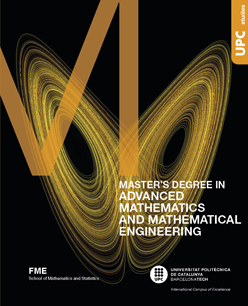General information
Master's degree in Advanced Mathematics and Mathematical Engineering (MAMME)
School of Mathematics and Statistics (FME)
The master’s degree in Advanced Mathematics and Mathematical Engineering (MAMME) (master's degree website) is a master's programme in mathematics offered at the School of Mathematics and Statistics (FME).
The courses offered in MAMME allow our students to design their curriculum with two different orientations: a pure mathematics curriculum (oriented to research in fundamental mathematics) or an applied mathematics curriculum (preparing them for applied mathematics research and for interdisciplinary teamwork, in collaboration with engineers, physicists, biologists, economists, etc.).
The curriculum comprises a total of 60 ECTS credits, divided into 45 credits for courses and 15 for the master’s thesis. It is intended to be completed in one academic year. In addition, MAMME offers the possibility of enrolling for up to 22.5 ECTS credits in other master's degrees in mathematics or statistics, or in other UPC master's programmes, opening the path for an interdisciplinary curriculum based on selected courses in master's degrees in engineering and applied sciences. See the MAMME focus proposals at http://mamme.masters.upc.edu/en.


